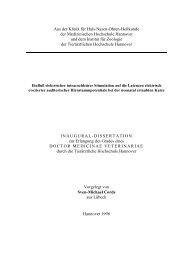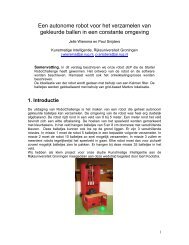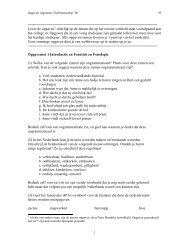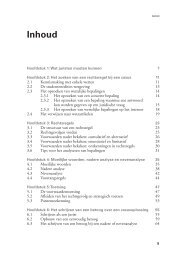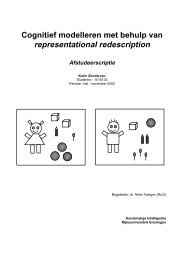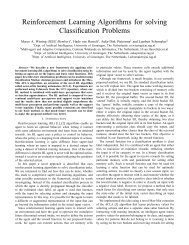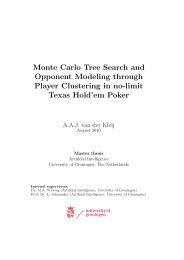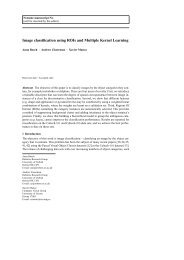Presuppositions in Spoken Discourse
Presuppositions in Spoken Discourse
Presuppositions in Spoken Discourse
You also want an ePaper? Increase the reach of your titles
YUMPU automatically turns print PDFs into web optimized ePapers that Google loves.
Between B<strong>in</strong>d<strong>in</strong>g and Accommodation<br />
CATEGORY(TAG) DESCRIPTION<br />
coreference(=) refers to someth<strong>in</strong>g mentioned earlier <strong>in</strong> the text<br />
new(N) new to you, new to text, not related, not described<br />
related(R) is related to someth<strong>in</strong>g earlier <strong>in</strong> the text, but isn‘t the same th<strong>in</strong>g - no<br />
description nearby<br />
described(D) self-explanatory because of how it is described, also new<br />
calculable(C) us<strong>in</strong>g <strong>in</strong>formation about a reference time or a reference place you can<br />
figure out what this means<br />
known(K) everyone knows what this is, its general knowledge, but this entity is<br />
new <strong>in</strong> the text<br />
Expression(E) the NP is part of an expression or idiom and does not really po<strong>in</strong>t out a<br />
real entity<br />
other(O) does not’ fit <strong>in</strong>to the above categories, expla<strong>in</strong> why<br />
Table 11 Categories for annotat<strong>in</strong>g def<strong>in</strong>ite NPs<br />
The examples which were categorized as calculable (C) are often considered<br />
deictic. The purpose of this category was to separate out examples that were<br />
dependent on the time and place of the dialogue. 10 For coreference (=) and related<br />
(R) the annotators had to identify the antecedent, alternatively the anchor that they<br />
considered the <strong>in</strong>terpretation of the def<strong>in</strong>ite to be dependent on, and if there was<br />
more than one potential anchor/antecedent, they were to take the most l<strong>in</strong>early<br />
recent one.<br />
The level of annotator agreement <strong>in</strong> the current annotation was much lower<br />
than for the material and annotation schemes reported on <strong>in</strong> Poesio & Vieira<br />
(1998). A Kappa score calculated on a subset of the data was only = 0.45 11 ,<br />
compared to 0.68 for the structurally based categories, and 0.58 for the semantically<br />
based categories <strong>in</strong> the annotation experiments done by Poesio & Vieira (1998).<br />
There are two possible explanations for this result. One may be that spoken<br />
language is more vague and this may have led to less clear-cut examples of each<br />
type (cf. Eckert & Strube 2000, (p. 82), who found that 77 of 264 pronouns <strong>in</strong><br />
annotation of spontaneous spoken dialogues were classified as “vague.”) The<br />
second, more likely reason, is that a classification task cannot be done with these<br />
categories. This may be either because the categories are <strong>in</strong>correct or because the<br />
def<strong>in</strong>itions of the categories are not clear. However, I believe the ma<strong>in</strong> reason for<br />
the low-level of annotator agreement is that some of the assumptions that lie<br />
beh<strong>in</strong>d the whole task are <strong>in</strong>correct, namely the assumption that it is possible to<br />
10 There seems to be no real consensus on where the dist<strong>in</strong>ction between deictic items and<br />
anaphoric items should be drawn as most expressions are context-dependent (see the discussion<br />
<strong>in</strong> Lev<strong>in</strong>son, 1997) so the potential dist<strong>in</strong>ction is ignored.<br />
11 This was done on the data before it was stored <strong>in</strong> a database, and there are numerous errors <strong>in</strong><br />
how it was calculated. However, I do not believe the agreement would have been so much higher<br />
if it had been calculated precisely.<br />
165



